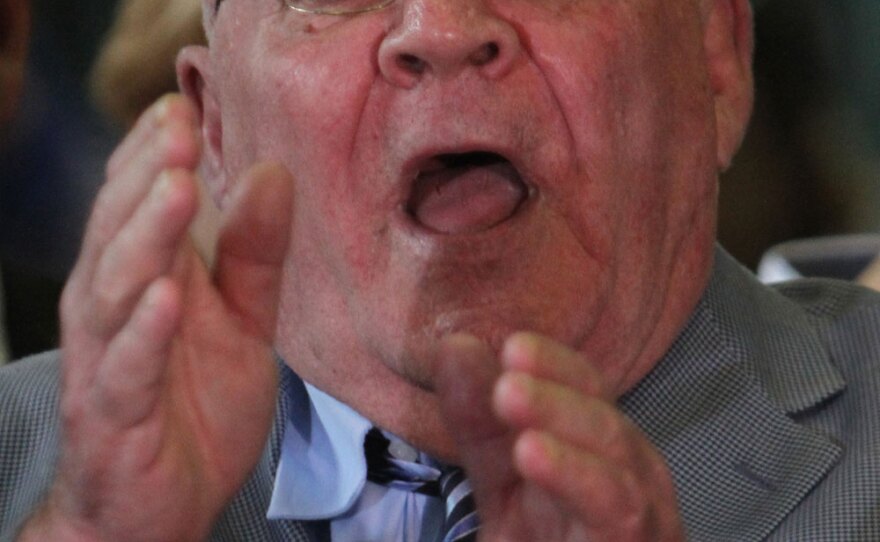The mistrial on most of the two dozen counts brought against former Illinois Gov. Rod Blagojevich proved something that prosecutors already knew: It's hard to convict politicians in corruption cases.
The fact that much of the public believes that most, if not all, politicians are crooks makes the job difficult.

"When you're dealing with corruption cases, there is a special dimension to jury dynamics," says Daniel Richman, a former federal prosecutor who now teaches at Columbia Law School. "You have a group of people who have a sense of local norms and what is tolerated and what is not."
Building a case against elected officials is hard to begin with. Prosecutors don't always have the sort of tools at their command that they did in the Blagojevich case -- namely, a wiretap -- to catch a politician on tape.
And public corruption cases can be particularly tough because they often turn on exchanges that closely resemble the normal run of government business. It is common and generally perfectly legal for politicians to appoint campaign contributors to boards and commissions -- if not necessarily a U.S. Senate seat, as Blagojevich, a Democrat, allegedly contemplated doing.
"Sad to say, given the role of money in politics in the United States, there really isn't a categorical difference between the run of politics as usual and felony fraud," Richman says.
What Goes On Behind Closed Doors
Prosecutors and investigators in public corruption cases usually have to work their way up a food chain. Someone facing conviction might seek a lighter sentence by leading them to a higher-ranking public official.
Otherwise, it can be hard to grab a foothold. If an individual gives a bribe to a politician, and the politician ends up voting the way that contributor wanted, both parties may be perfectly satisfied. If neither one squawks, no one else may be the wiser. All the rumors and subpoenaed documents in the world may not lead to enough evidence to bring a case.
Even when prosecutors do have a firm sense that money changed hands to influence an official act, they may not be able to bring criminal charges. The people involved may be able to avoid prosecution by avoiding certain "magic words" that would turn their transaction into an illegal quid pro quo, Richman says. No flat statements, for example, about this-money-being-exchanged-for-this-favor.
Honest Services Fallout
Not being able to prove outright bribery or fraud is one reason prosecutors have often charged public officials and corporate executives with violating a statute that says citizens are entitled to "an intangible right of honest services."
The statute has been used in numerous public corruption cases, including those involving former Rep. William J. Jefferson of Louisiana and former Gov. Don Siegelman of Alabama, both Democrats.
But in June, the Supreme Court found that the honest services statute was too vague to pass constitutional muster. The court said that it can be used in certain instances, such as bribery. But, if prosecutors can prove that bribery occurred, they don't need to bring an honest services charge.
"Obviously, honest services was very valuable and very widely used," says Carl Tobias, a law professor at the University of Richmond. "Prosecutors liked it because it was relatively easy to add that count and relatively easy to prove."
Inherent Conflicts Of Interest
Honest services were not at issue in the Blagojevich case. But even after the Supreme Court decision, a spokesperson with the Department of Justice says, prosecutors still have "thousands of charges in our tool kit."

When they are unable to prove broader instances of corruption, prosecutors sometimes bring relatively minor charges -- such as lying to a federal official, the one count on which Blagojevich was convicted.
"What they're able to get these guys on is so narrow," says Karen Hobert Flynn, vice president for state operations at Common Cause, a government watchdog group. "It's very difficult to prove the corruption, so they settle for lying to federal officials."
Even when they do bring charges of bribery, prosecutors may be forced to fall back on relatively small acts of malfeasance -- accepting a bribe of $1,000, say, or some nice home furnishings from a state contractor.
In such cases, the distinction between bad judgment and illegal behavior can get blurry. The notion that Blagojevich was simply practicing "politics as usual" was the subject of debate in his jury's hearing room, according to statements from jurors following Tuesday's verdict.
In some states, Hobert Flynn notes, politicians can accept gifts, travel and cash in the form of honorariums from people doing or seeking business with the government.
"Lawmakers have conflicts of interest all the time," she says. "They're getting large contributions funneled in many different ways from people who are often state contractors and often want and get something in return. That's perfectly legal."
The Need For Public Vigilance
In cases that turn on a thousand dollars or some other petty amount, opinion in the jury room -- and in the court of public opinion -- may turn against prosecutors. Not knowing whether the small amount represents just the tip of the iceberg -- or is the iceberg -- can lead some to believe prosecutors are unfairly targeting a particular politician for petty reasons.

That's especially true if there's a sense that such small favors are exchanged all the time. "The public view in general is that all politicians are somewhere close to corrupt, and really the profession is corrupt," says John Weingart, associate director of the Eagleton Institute of Politics at Rutgers University. "The notion of meeting with a variety of people with differing views, sometimes behind closed doors, feels tainted to the public."
Prosecutors have to show that public officials have sought personal gain and haven't just been acting in accordance with the dictates of their job. Indicted politicians will often say they voted just the way their consciences dictated and that they were not influenced by any coincidental financial considerations. Or that the help they offered to a hospital on whose board their wife happens to sit is the same sort of help they would give any institution in their district.
In Blagojevich's case, the former governor followed a time-honored strategy among politicians charged with corruption to make the prosecutor's job even more difficult. Blagojevich professed his innocence loudly and publicly. And then, his defense added a twist: arguing that he's basically just a big talker. The jury heard dozens of tapes of an often-profane Blagojevich discussing possibly illegal fundraising strategies. "The whole blowhard act," as Richman, the Columbia law professor, calls it.
It may not have been exculpatory, but it may have helped open up doubts in at least one juror's mind about the seriousness of Blagojevich's alleged plans to sell off President Obama's former Senate seat.
Richman says that prosecutors don't generally bring cases where the line between normal political activity and personal corruption is, in fact, all that blurry. But, he adds, it's up not only to prosecutors but to the public at large to understand the difference.
"You can write all the laws you want, but where you have consensual corruption and a readiness among voters, even when there is some evidence of corruption, to vote the same people back into office, there's a limit to what prosecutors can do," he says. "If you don't have a public that cares as voters or as jurors, nothing happens."
This all is likely to be played out again. The Blagojevich case prosecutors have already said they plan to seek a retrial.
Copyright 2022 NPR. To see more, visit https://www.npr.org. 9(MDAzMjM2NDYzMDEyMzc1Njk5NjAxNzY3OQ001))





